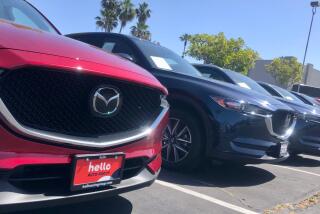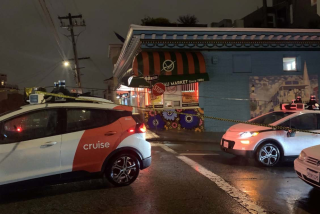Mid-Size Chrysler, Dodge Cars Flunk Crash Test
- Share via
DETROIT — DaimlerChrysler’s mid-size Chrysler and Dodge cars scored badly in crash tests, including one in which an air bag deployed late, a national insurance group said Wednesday.
The auto maker’s 1999 and 2000 model Chrysler LHS and 300M mid-sized sedans were rated “poor,” while the 2000 Dodge Intrepid and Chrysler Concorde mid-size cars received a “marginal” rating, according to the Insurance Institute for Highway Safety, which represents large insurers.
All four cars are made at DaimlerChrysler’s Bramalea, Canada assembly plant and share the same platform. They are the only mid-size cars made by DaimlerChrysler’s U.S. Chrysler unit.
Cars tested that received the top rating of “good” included General Motors Corp.’s 1997-2000 model Buick Park Avenue, 2000 Cadillac Seville, 2000 Buick LeSabre and Pontiac Bonneville, and 2000 Chevrolet Impala; and Toyota Motor Corp.’s 1999-2000 model Lexus GS 400/300, the insurance group said.
In the crash tests, the insurance group drove the vehicles at 40 mph into a steel-and-concrete barrier mounted with a facing of aluminum honeycomb shaped like a vehicle front. The test is meant to simulate two vehicles of the same size crashing at a slight angle to head-on.
With the LHS, the main problem was with the air bag, which fired too late to prevent a dummy from hitting its head hard against the steering wheel, said Brian O’Neill, institute president.
DaimlerChrysler spokesman Mike Aberlich said the company ran two of its own car-on-car crash tests using the LHS after the institute approached it with the results. The German-U.S. auto maker found no late deployments and said the institute’s simulation was not a real-world situation.
“We are convinced this late-fire phenomenon is more of an artifact of the test than it is of real world,” Aberlich said. “And our first priority is going to be to perform well in the real world as well as meet the standards of the government. We’ll not compromise the real-world safety in order to achieve a higher rating in the consumer test.”
He said in the institute’s tests, sensors can sometimes be fooled into thinking the crash is at low speeds, causing the delayed air-bag deployment.
O’Neill replied that DaimlerChrysler’s claims do not alter the fact that some real-world accidents may mimic the institute’s simulations.
Aberlich said DaimlerChrysler could make vehicle sensors more sensitive, but then the air bags would deploy more often and unnecessarily during low-speed collisions.






